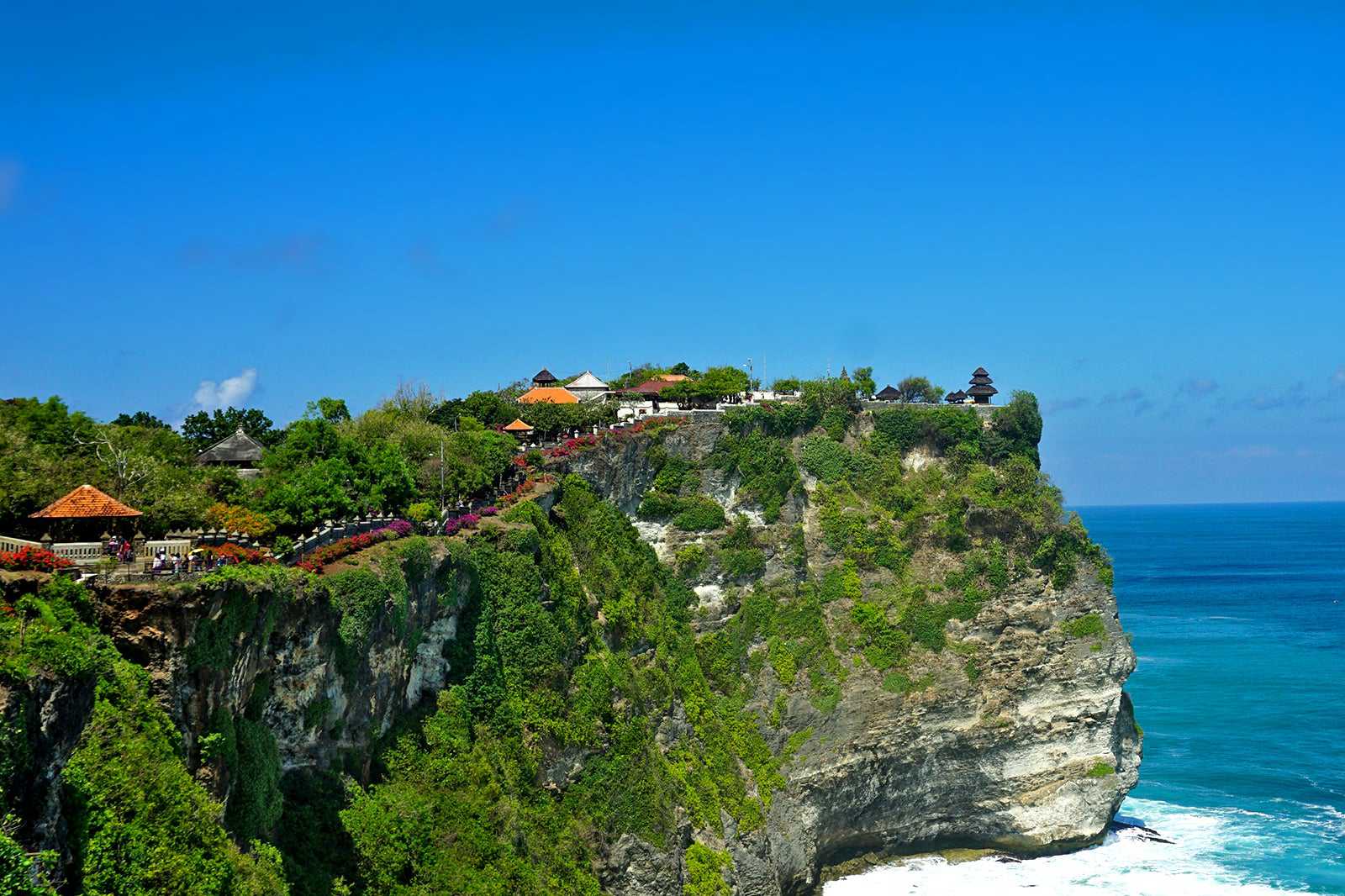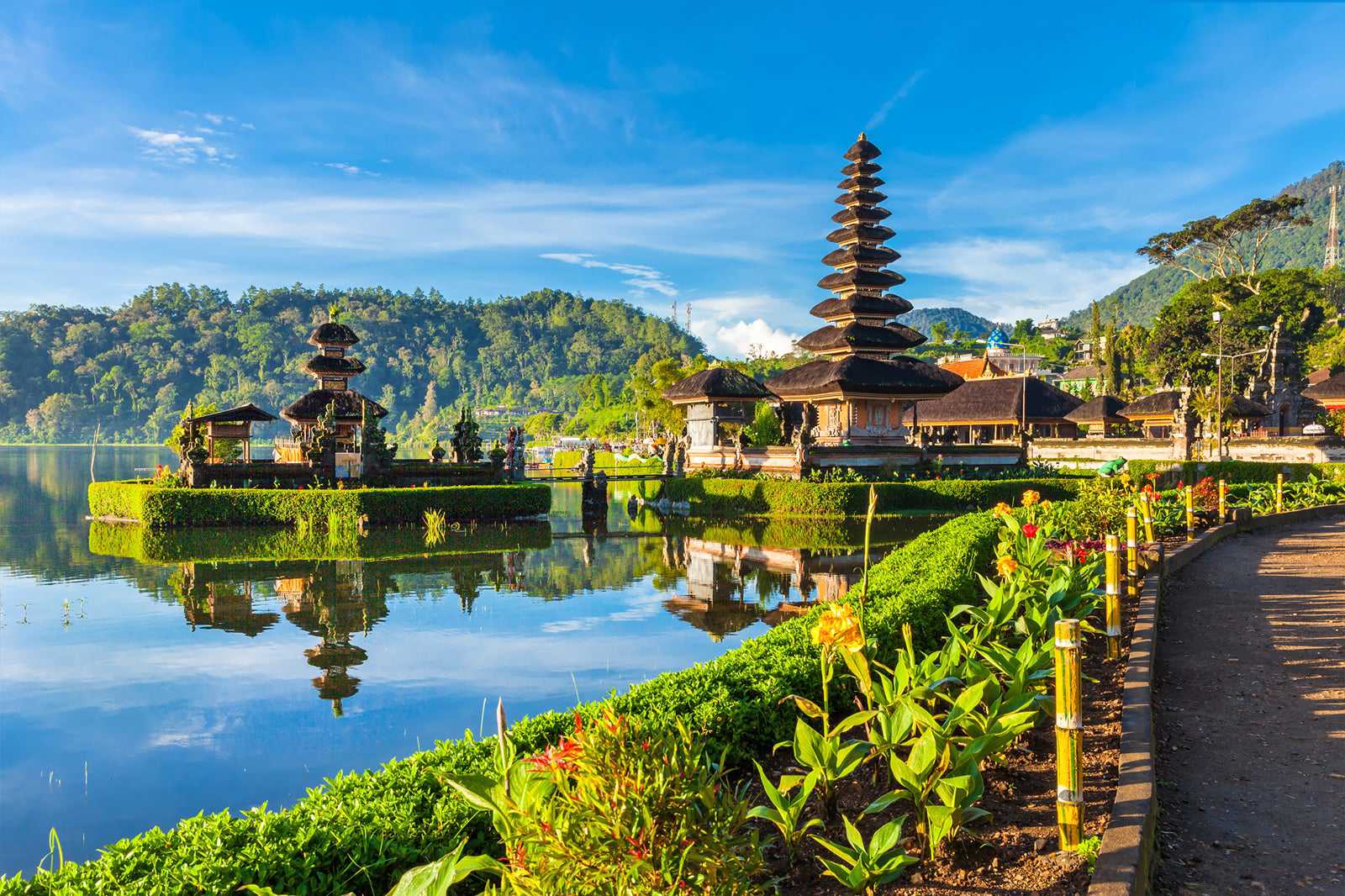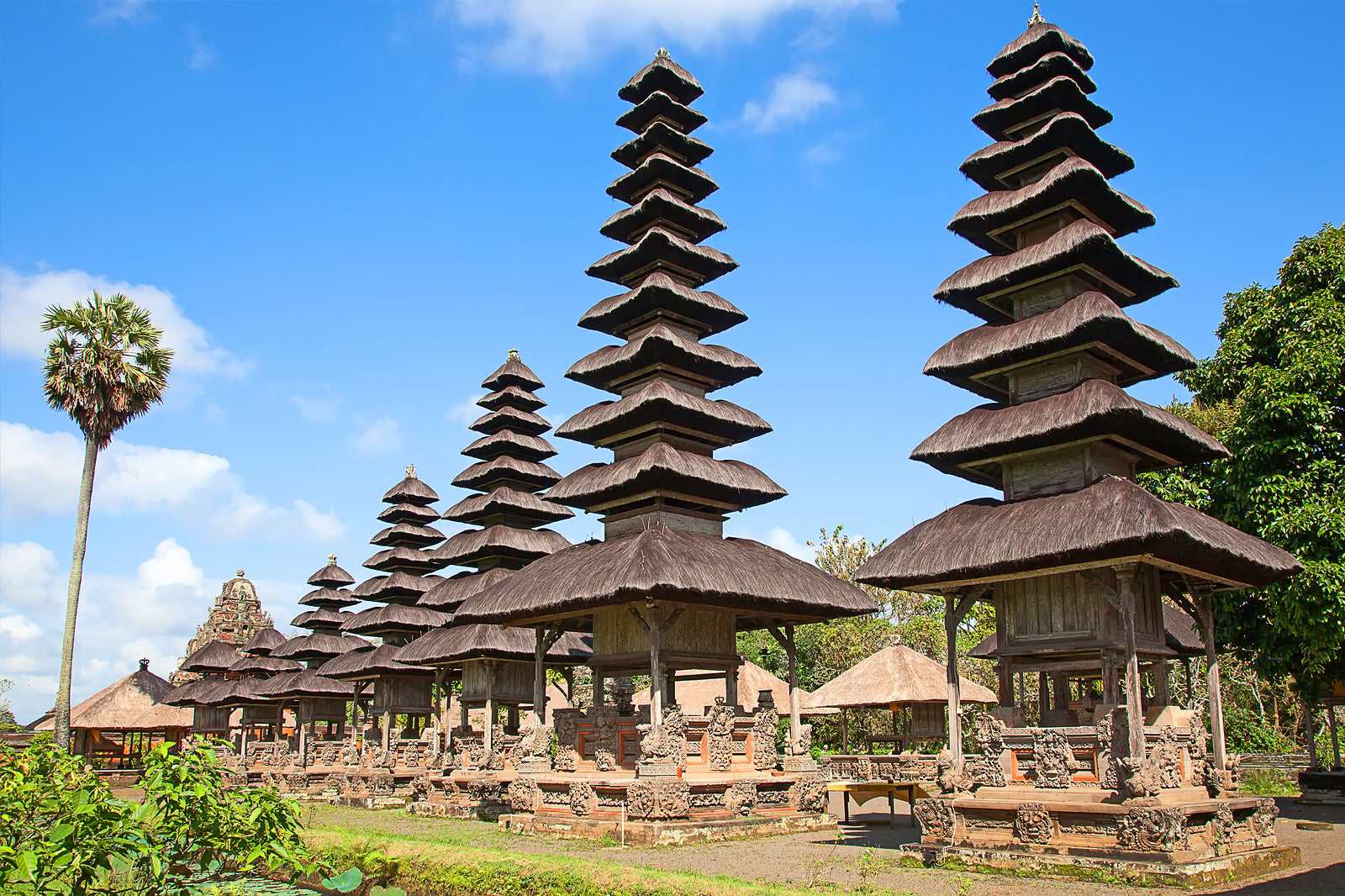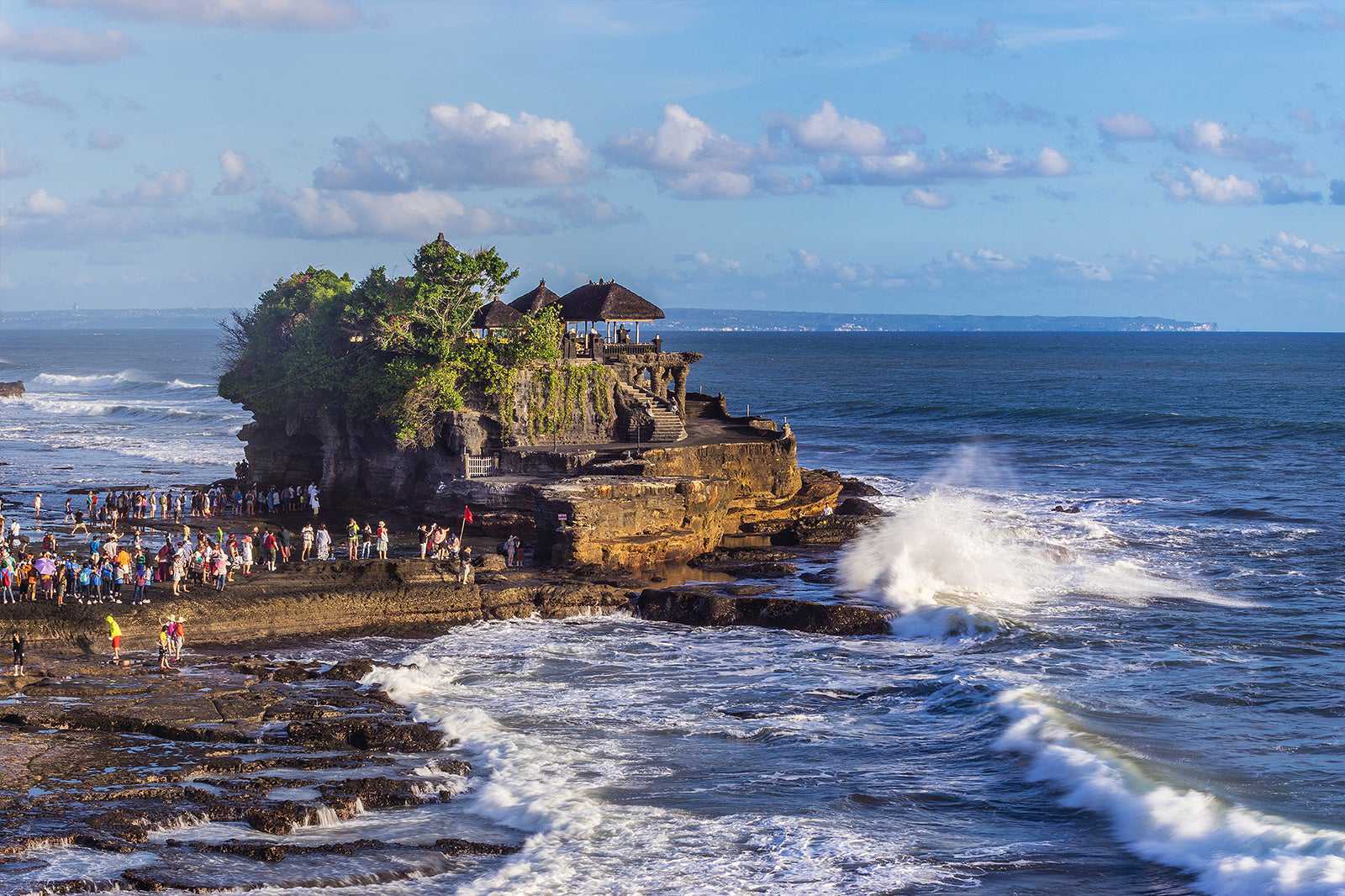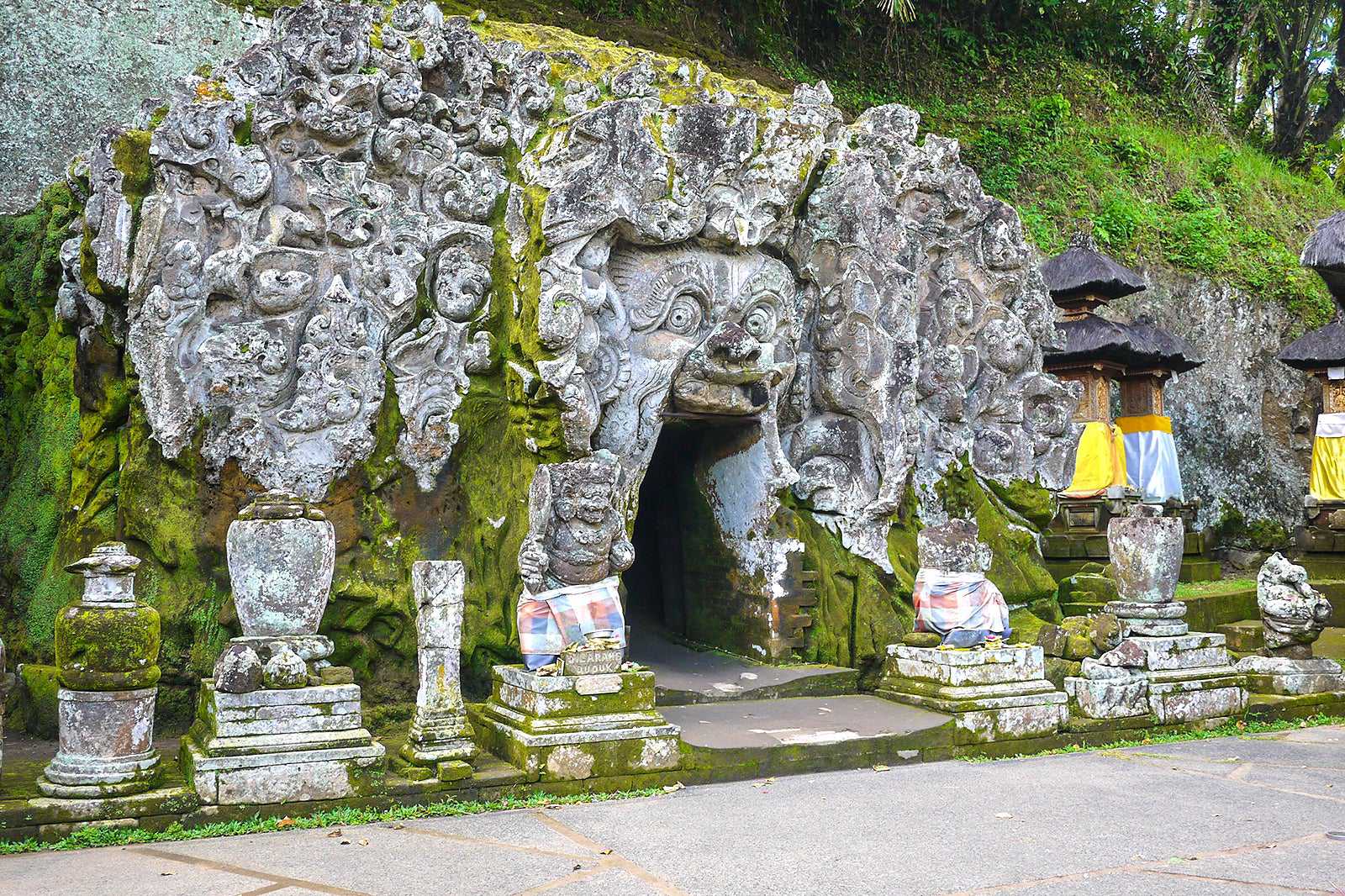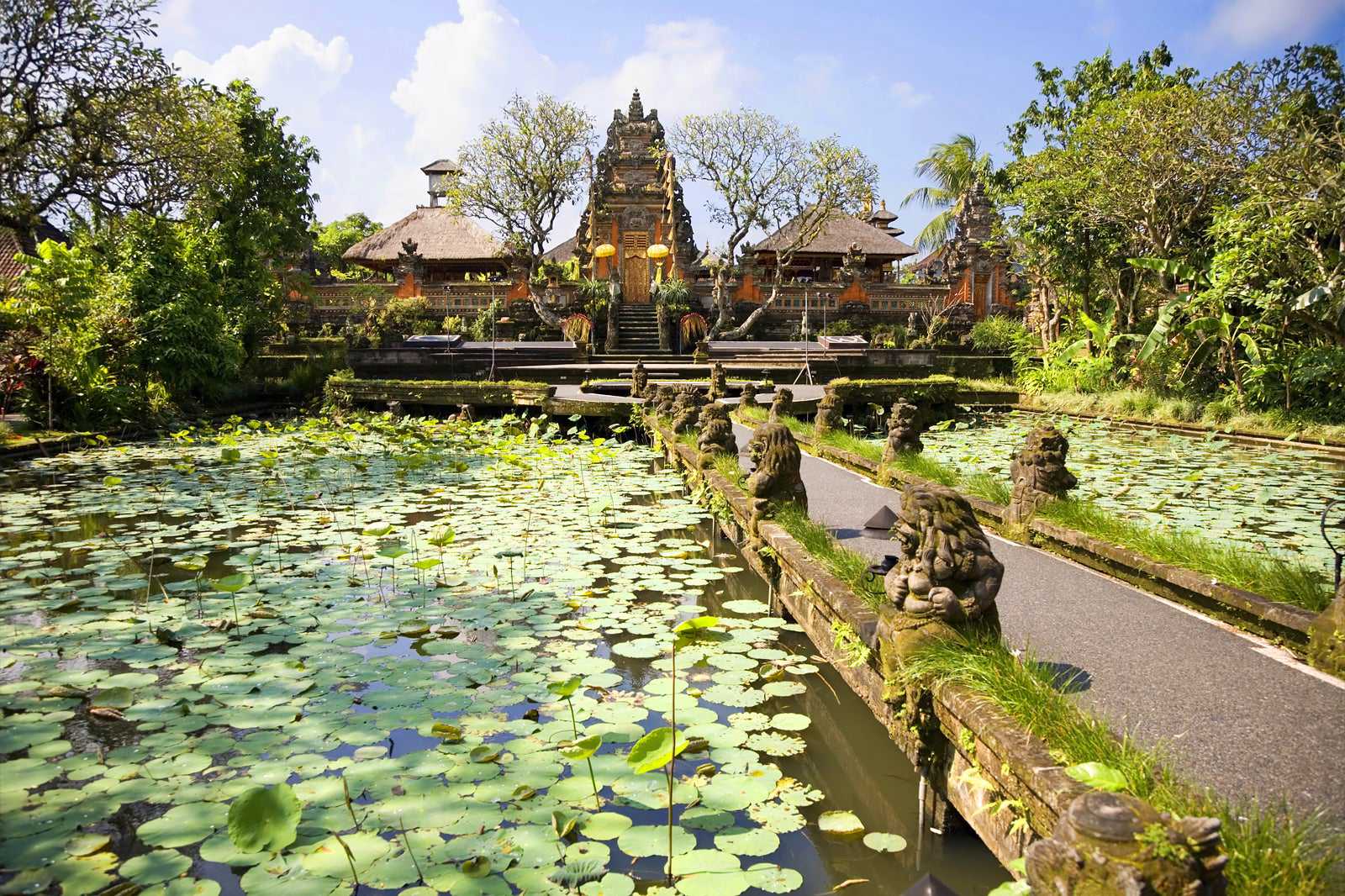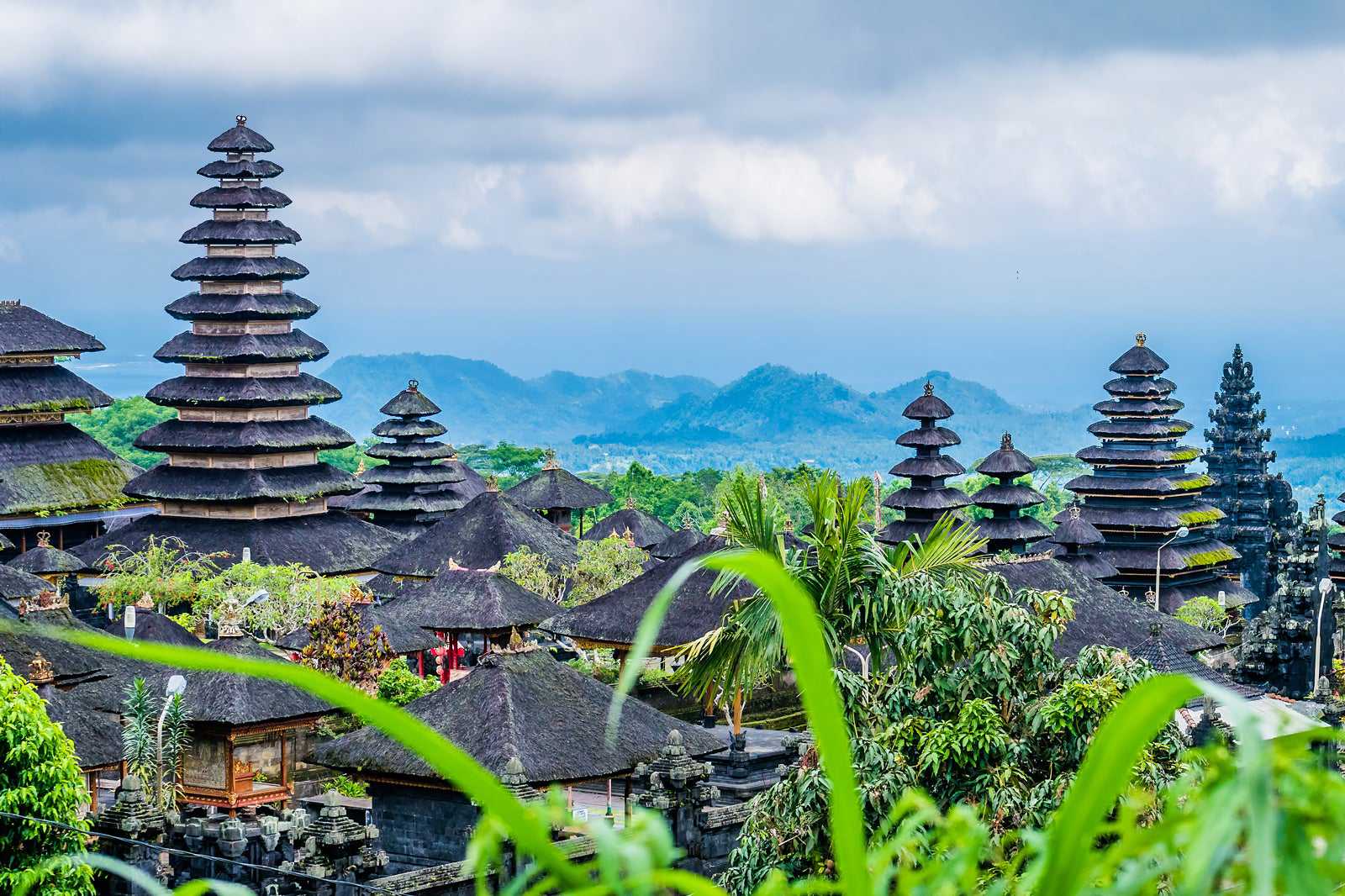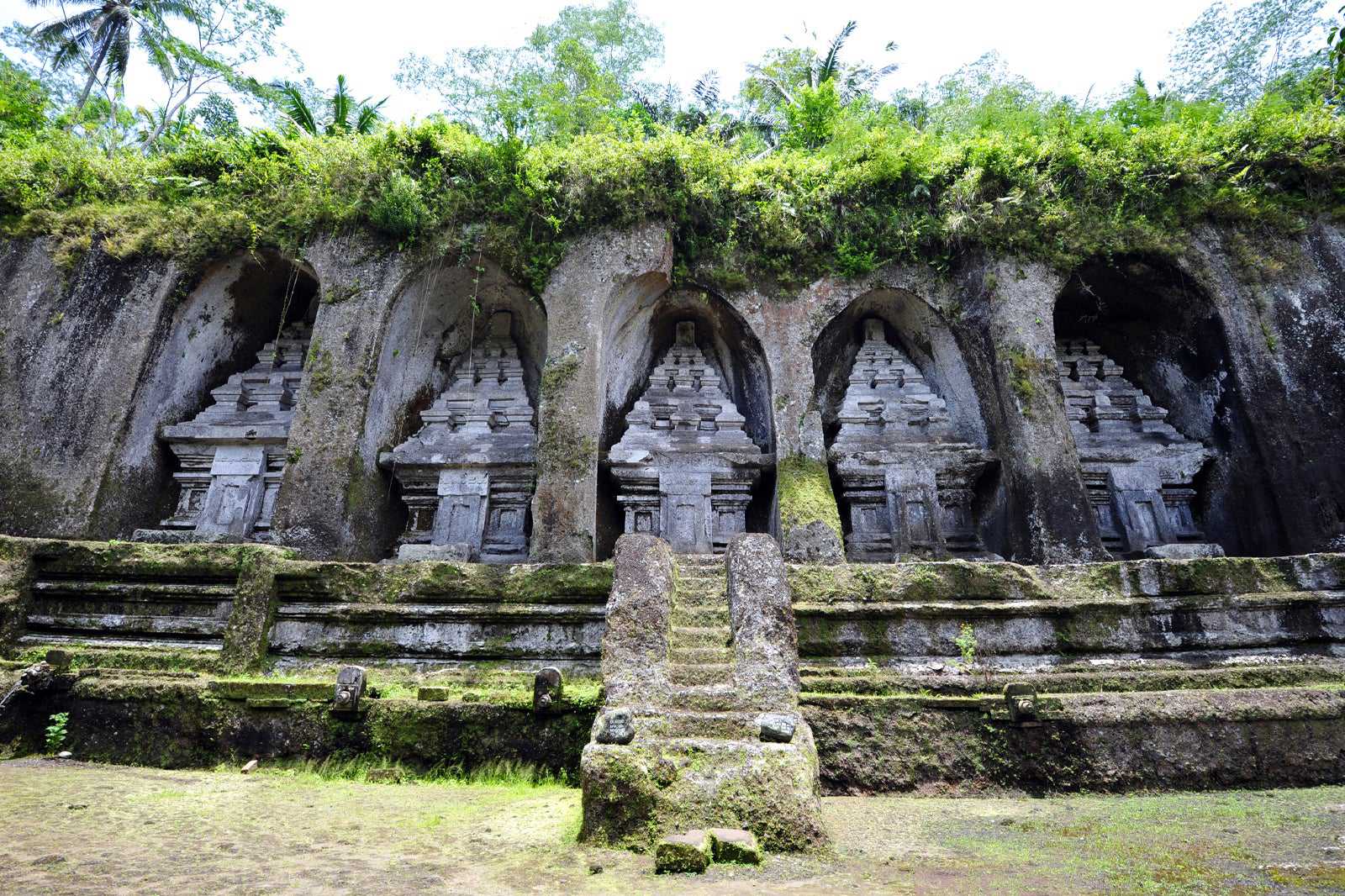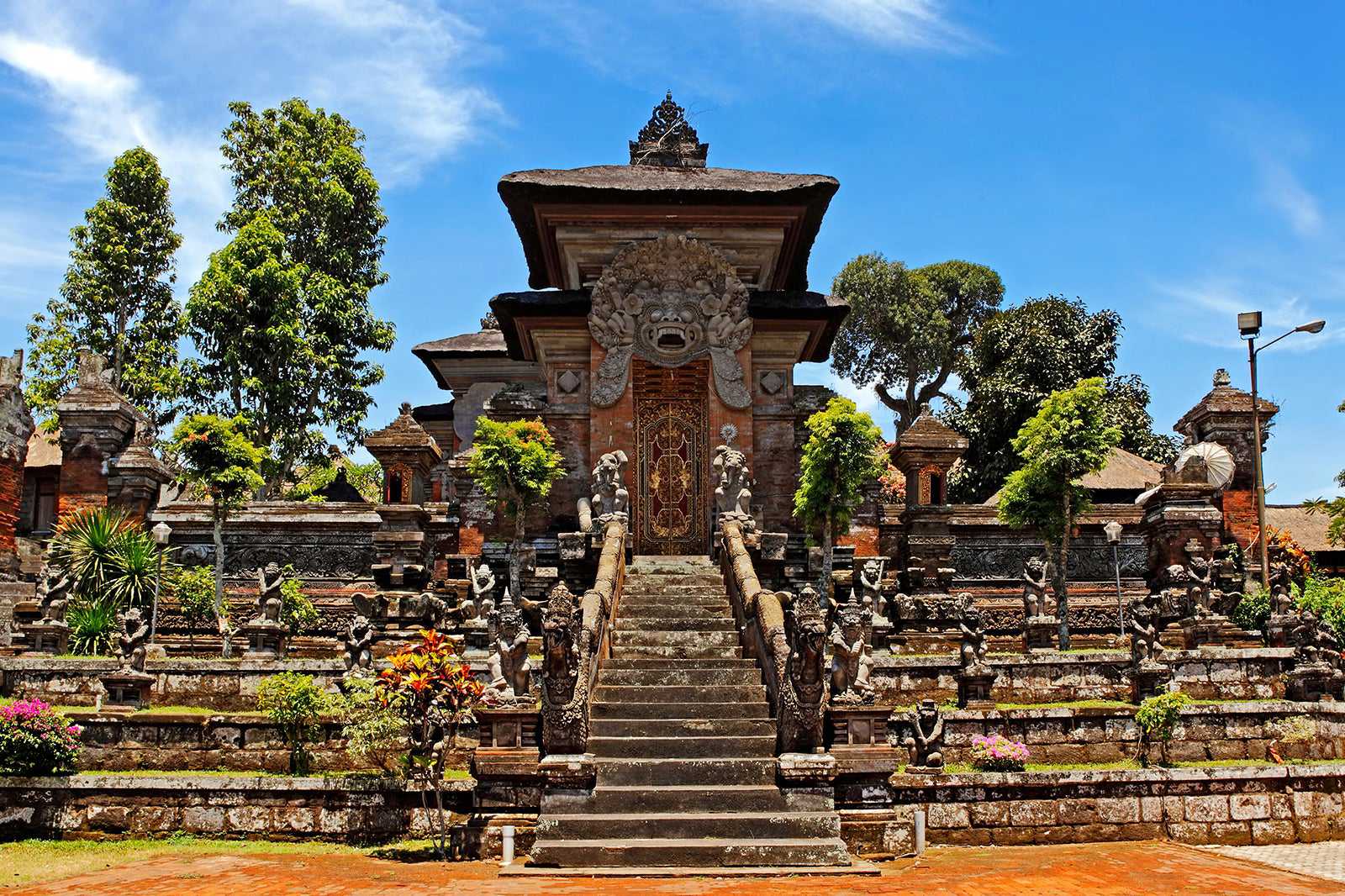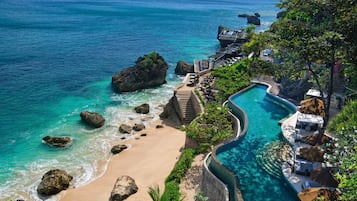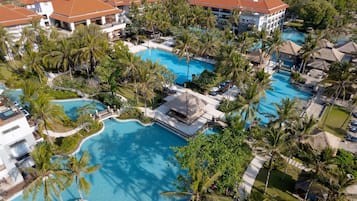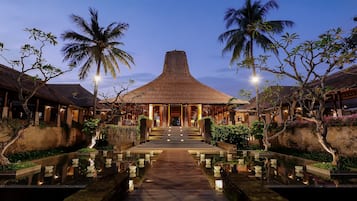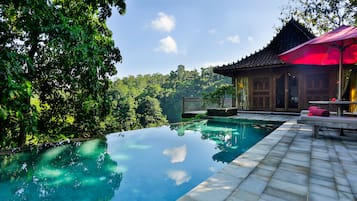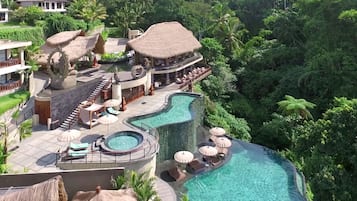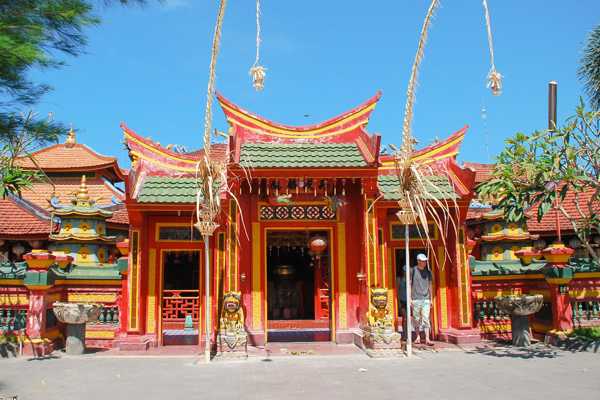Ancient Bali temples dot the highlands and coasts, boasting magnificent centuries-old architecture. Several have become some of the island’s most iconic landmarks. Great for photos, they're usually set against exotic backdrops. They’re most colorful during festive temple anniversaries. Such events occur twice a Gregorian year since dates are based on a local 210-day calendar.
On any other day, these temples are great places to visit at least once during your visit. Each temple is unique. Try Besakih, ‘Bali’s mother temple’, set against majestic Mount Agung, for instance. Or, the mysterious ruins of Goa Gajah near Ubud. Uluwatu and Tanah Lot against golden sunsets can be truly magical. Proper attire – a sarong and sash – are mandatory for Bali temple visits.
- 1
Uluwatu Temple
Pecatu, South Bali
- History
- Photo
Read moreUluwatu is one of Bali's picture postcard temples, whose cliff base is also known among surfers as an exotic surf spot. The temple sits on a clifftop in Bali’s southwest, about 70 meters above the crashing waves. 'Pura Luhur Uluwatu' as the locals call it, similarly shares the splendid sunset backdrops of the Tanah Lot sea temple in West Bali. Even so, Uluwatu’s more elevated perch provides broader and more breathtaking seascapes.
Pathways throughout the site allow you to witness the ancient architecture and sculptures from up close. A dense forest inhabited by gray long-tailed macaques surrounds the temple. An open-air amphitheater nearby regularly shows the Ramayana ballet or Kecak dance during the golden sunset hours – perfect for memorable pictures.
Location: Jalan Raya Uluwatu, Pecatu, Badung, Bali 80361, Indonesia
Open: Daily from 9 am to 6 pm
Map - 2
Ulun Danu Beratan Temple
Bedugul, Tabanan
- History
- Photo
Read moreUlun Danu Beratan Temple is a picturesque landmark temple in Bali’s central highlands. The temple sits on the western side of Beratan Lake. The smooth reflective surface of Beratan surrounds most of the temple’s base, creating a unique floating illusion. The mountain range provides the temple with its hazy, dreamy backdrop.
The striking scenery and cool atmosphere of these uplands have made the temple a favorite sightseeing spot. The large flowering lakeside gardens offer an enjoyable time with many photographic moments. Recreational activities include short boat trips on the lake. You can also enjoy leisurely rides on 2-seater duck paddle boats as well as a host of other water sport activities.
Location: Candikuning, Baturiti, Tabanan, Bali 82191, Indonesia
Open: Daily from 8 am to 6 pm
Map - 3
Taman Ayun Temple
Mengwi, Badung
- History
- Photo
Read moreThe 17th-century Taman Ayun temple is the main landmark of the Mengwi village in the Badung regency. It showcases great examples of traditional Balinese Hindu temple architecture. The temple has well-maintained courtyards and enclosures. Inside is an expansive tropical garden and water features with lotus and fish ponds.
Towering tiers from the shrines make up most of the profile of Taman Ayun. The temple is the heritage site of the Mengwi kingdom and its late ruler, Tjokorda Sakti Blambangan. You can find hints of Chinese influences throughout the temple's architecture and reliefs.
Location: Jalan Ayodya No.10, Mengwi, Badung, Bali 80351, Indonesia
Open: Daily from 9 am to 4 pm
Map - 4
Tanah Lot
Tabanan, West Bali
- History
- Photo
Read moreTanah Lot regularly features on Bali postcards and travel brochures, thanks to its stunning and unique offshore setting. It comprises an ancient Hindu shrine that sits on top of an outcrop amidst constantly crashing waves from the Indian Ocean. The sea temple is a constant highlight on tours to Bali’s western region – sunsets here are not to be missed.
The temple is about 45 minutes’ drive north from Kuta. Nearby are smaller onshore village temples and visitors’ leisure facilities such as restaurants, shops and a cultural park where dance performances are shown. Best time to visit Tanah Lot is during the day of Kuningan and on the temple’s anniversary 5 days later when festive pilgrimages are among the common sights.
Location: Jalan Raya Tanah Lot, Beraban, Kediri, Tabanan, Bali 82121, Indonesia
Open: Daily from 7 am to 7 pm
Map - 5
Goa Gajah
Ubud, Central Bali
- History
Read moreGoa Gajah is an archeological complex with historical significance that’s great for a brief layover on tours to the Ubud and the central Bali region. Even though its name translates to ‘Elephant Cave’, you won’t find any pachyderms here. The cave was built as a hermitage back in the 11th century. It’s quite shallow, containing stone idols and meditation spaces.
In front of the mysterious cave, you’ll find a wantilan or meeting hall and a temple courtyard. An open-air gallery of large stone relics lies near an ancient bathing pool that was excavated in 1954. You can enter the pool and see the statues of nymphs holding waterspout vases up close, or explore the legendary Petanu River and its stone artifacts behind the temple grounds.
Location: Jalan Raya Goa Gajah, Pejeng Kawan, Tampaksiring, Gianyar, Bali 80582, Indonesia
Open: Daily from 8 am to 4 pm
Map - 6
Tirta Empul Temple
Gianyar, Central Bali
- History
- Photo
Read moreTirta Empul is a national cultural heritage site. It dates back to 960 AD during the old Balinese kingdom rule of the Warmadewa Dynasty. Its name means ‘holy water spring’ and is actually the name of a water source located within the temple. This spring flows into various purification baths, pools and fish ponds.
The water then flows into the Tukad Pakerisan River nearby. Various sites and archeological relics throughout the region relate to local myths and legends. Another nearby and prominent site on top of a hill is the presidential palace, Istana Tampaksiring. The palace was built during the years of the nation’s first president, Soekarno.
Location: Jalan Tirta, Manukaya, Tampaksiring, Gianyar, Bali 80552, Indonesia
Open: Daily from 9 am to 5 pm
Map - History
- Photo
Read moreThe Pura Taman Saraswati is a beautiful water temple in central Ubud. You can access the temple from the Jalan Kajeng side street off the main road of Jalan Raya Ubud. The temple is a great layover along your leisure walks through Ubud town, where you can admire its classical Balinese temple architecture and enjoy photo opportunities.
Its beautiful foyer features ponds filled with blooming pink lotuses. Most regular visitors drop into Café Lotus for a minimum dinner cover charge, which gets you the best view over the lotuses and to the temple’s open stage. Regular traditional dance performances are held in the evenings here from 7.30pm.
Location: Jalan Kajeng, Ubud, Gianyar, Bali 80571, Indonesia
Map- 8
Besakih Temple
Karangasem, East Bali
- Budget
- Couples
- Families
- History
- Photo
Read moreBesakih Temple is often referred to as Bali’s ‘mother temple’ – a grand complex of different clan temples and shrines on the south-western slopes of Mount Agung. At least 70 celebrations are held at Besakih yearly, as each shrine has its own anniversary. Exploring the whole site can take a day. Even so, most visits cover only the largest central complex, Pura Penataran Agung.
Another temple, Pura Pasimpangan, lies east of Pura Penataran Agung. On the higher slopes is Pura Pengubengan, offering great vistas from 1,000 meters above sea level. Sarongs and sashes are compulsory attire when visiting the temple, available usually for a 'donation fee' at the main entrance. You can also buy some colorful souvenir textiles from the many kiosks that dot the parking area.
Location: Besakih, Rendang, Karangasem, Bali 80863, Indonesia
Open: Daily from 8 am to 5 pm
Map - 9
Lempuyang Temple
Karangasem, East Bali
- Budget
- Couples
- Families
- History
- Photo
Read moreLempuyang Temple is one of Bali’s oldest and most venerated temples. It's on par with Besakih Temple. This temple is also believed to predate the majority of Hindu temples on the island. It's a great addition to any travel plans to East Bali, especially for the fit and adventurous.
The main temple is at 1,175m above sea level, on the peak of the namesake Mount Lempuyang. The grander Penataran Agung temple at the slope of the mountain is very popular for Instagram shots. If you wish to reach the temple at the peak, it's a steep climb up over 1,700 steps. At the top, the prize view is a sweeping panorama over East Bali's lush topography.
Location: Jalan Pura Telaga Mas Lempuyang, Tri Buana, Abang, Karangasem, Bali 80852, Indonesia
Map - 10
Gunung Kawi Temple
Northeast of Ubud, Central Bali
- History
- Photo
Read moreThe Gunung Kawi Temple complex is one of Bali’s most unique archeological sites. The temple comprises a collection of ancient shrine reliefs carved into the face of a rock cliff. The main site overlooks the sacred Pakerisan River. This is the same river that flows by the Tirta Empul Temple, a kilometer north.
A temple courtyard featuring old Hindu shrines is across the river from the ancient reliefs. You can reach the temple on foot down a paved walkway, passing art shops and small local warungs food kiosks. Lush paddy terraces and a gorgeous green valley accompany you down the 300 steps leading to the river. The whole view transports you back in time and away from modernity.
Location: Banjar Penaka, Tampaksiring, Gianyar, Bali 80552, Indonesia
Mapphoto by chensiyuan (CC BY-SA 4.0) modified
- 11
Ling Gwan Kiong
Buleleng, North Bali
- History
Read moreLing Gwan Kiong is an old Chinese temple in North Bali. It dates to 1873 with connections to the Ching Dynasty. Be sure to take off your shoes and keep calm when entering the inner sections, where devotees come, light incenses and conduct prayers before a beautiful altar.
Ling Gwan Kiong is a 15-minute drive east from Lovina Beach and features mini gardens with colorful and detailed murals.
Location: Jalan Erlangga No.65, Bugis, Buleleng, Bali 81114, Indonesia
Map - 12
Petitenget Temple
Seminyak
- Budget
- Couples
- Families
- History
- Photo
Read morePetitenget Temple is Seminyak’s central cultural landmark. Known as Pura Petitenget in the local tongue, the centuries-old temple is a must-see and really comes to life during its festive 210-day anniversaries. The name of the street that runs parallel to the beach is actually taken from the temple.
The namesake Petitenget Beach is only a few steps away from the temple, where visitors and locals enjoy the best spots to share in the gorgeous sunset moments.
Location: Jalan Petitenget, Kerobokan, Badung, Bali, Indonesia
Map - 13
- Budget
- Couples
- Families
- History
- Photo
Read moreGunung Lebah Temple is one of Ubud’s central landmarks, positioned at the western end of the Jalan Raya Ubud main road. The temple’s name loosely translates to ‘mountain valley temple’ in archaic Balinese. It dates back to the 8th century, and has close spiritual ties to Batur Temple.
Gunung Lebah itself honors the goddess of Batur. The temple complex has 3 courtyards, resting pavilions for devotees, and a gamelan pavilion that hosts traditional dances.
Location: Jalan Raya Ubud No.23, Sayan, Ubud, Gianyar, Bali 80571, Indonesia
Map - 14
Batukaru Temple
Tabanan, West Bali
- History
- Photo
Read moreBatukaru Temple, or Pura Luhur Batukaru, is one of Bali’s key temples. The temple is at the foot of Mount Batukaru, the second-highest peak on the island. Surrounded by cool natural forests, it's a pleasant layover for sightseeing in the Tabanan regency. Batukaru Temple's main courtyard has a freshwater spring that serves as the holy water source for prayers and ceremonies.
Location: Jalan Penatahan-Wongayagede, Wongaya Gede, Penebel, Tabanan, Bali 85125, Indonesia
Map - 15
Batuan Temple
Gianyar
- History
- Photo
Read moreBatuan Temple is a local Hindu temple in the village of Batuan, about 10 km south of central Ubud. This 11th-century shrine faces a large communal hall, where devotees pray and present offerings. Well-preserved sandstone motifs and traditional Balinese temple architecture are its main draws. You'll also see multi-tiered thatched-roof shrines within the temple’s inner courtyard.
Location: Jalan Raya Batuan, Batuan, Sukawati, Gianyar, Bali 80582, Indonesia
Map - 16
Kehen Temple
Bangli
- Budget
- Couples
- History
- Photo
Read moreKehen Temple is an ancient Hindu temple complex in the Bangli regency. It has unique architectural features. Sandstone carvings of mythic animals adorn the staircases, while statues of Balinese folklore figures decorate the central vestibule. The temple’s walls are also ornate with Chinese porcelain plates. These are tributes to the historical relations between the local Bali kingdom and China.
Location: Jalan Sriwijaya No.8, Cempaga, Bangli, Bali 80613, Indonesia
Open: Daily from 9 am to 5 pm
Map - 17
- Budget
- Couples
- History
- Photo
Read moreVihara Dharmayana is one of the oldest Buddhist temples in Kuta. Founded in 1876, the temple’s main structures are well-maintained, with intricate Far Eastern architecture in bright colors. The courtyard is calm with constant wafts of incense smoke coming from the altars. Slightly hidden and located on a side-street, Vihara Dharm Ayana Kuta is around 1 km east of the main coastal strip of Kuta.
Location: Jalan Blambangan No.12, Kuta, Badung, Bali 80361, Indonesia
Open: Daily from 9 am to 8 pm
Phone: +62 (0)361 762 362
Map - 18
Penataran Sasih Temple
Gianyar

- History
- Photo
Penataran Sasih Temple is known as ‘The Moon Temple’ as it houses an ancient bronze kettle drum called ‘Moon of Pejeng’. It is the largest bronze kettle in Southeast Asia, at about 2 meters in length and dates back to 300 BC. The Hindu temple dates back to 1266 AD, and served as the state temple of the Pejeng kingdom.
Pura Penataran Sasih also displays a stone Seat of Ganesh in the middle of the main courtyard, a modern chronogram in front of the entrance, and several Hindu sculptures. Pura Penataran Sasih is around 6.5 km east of Ubud.
Location: Jalan Raya Tampaksiring, Pejeng, Tampaksiring, Gianyar, Bali 80571, Indonesia
Mapphoto by Michael Gunther (CC BY-SA 4.0) modified
- 19
Samuan Tiga Temple
Gianyar
- Budget
- Couples
- Families
- History
- Photo
Read moreSamuan Tiga Temple was the royal temple of the Udayana Warmadewa dynasty. Assumed to be the venue for the great meeting between Gods, deities and saints, the temple is known for hosting Siat Sampian, a Balinese Hindu ritual that takes place every 10th full moon (known as Purnama Kadasa), or roughly every April.
Location: Jalan Raya Bedulu, Blahbatuh, Gianyar, Bali 80581, Indonesia
Map - 20
Blanjong Temple
Sanur

- History
Blanjong Temple displays one of Bali’s oldest known artifacts, which dates back to 914 CE. It’s a stone pillar with Sanskrit inscriptions, and believed to be some sort of victory monument, chiefly of King Sri Kesari Warmadewa. The first king of the Balinese Warmadewa dynasty, he was believed to have installed Bali's first formal government. Blanjong Temple also showcases sandstone statues of Hindu lord Ganesh and various animal figures. The temple is a national cultural heritage site and welcomes visitors year-round.
Location: Jalan Danau Poso, Sanur, Denpasar, Bali 80228, Indonesia
Map - 21
Beji Temple
Buleleng, North Bali
- Budget
- Couples
- Families
- History
- Photo
Read moreBeji Temple, locally referred to as Pura Beji, is a large and beautiful temple complex in the village of Sangsit in North Bali. The temple dates to the 15th century, during the spread of the Majapahit kingdom from Java. Carvings throughout the temple are inspired by Hindu epics with a mixture of fables and legends, including serpents and demons. As with visiting any temple in Bali, proper attire in the form of a simple sarong and sash around the waist is advised.
Location: Jalan Raya Sangsit, Sangsit, Sawan, Buleleng, Bali 81171, Indonesia
Map - 22
Meduwe Karang Temple
Buleleng, North Bali
- Budget
- Couples
- Families
- History
- Photo
Read moreMeduwe Karang Temple is a beautiful landmark in the district of Kubutambahan, North Bali. The temple is around 15 km from Lovina Beach and a half-hour drive from the capital of Singaraja.
The temple features classical Balinese stone temple architecture. But most peculiar is its wall relief of a highly stylised man riding a bicycle with floral wheels.
Location: Jalan Raya Air Sanih, Kubutambahan, Buleleng, Bali 81171, Indonesia
Map - 23
Sakenan Temple
Serangan Island, Denpasar
- History
Read moreSakenan Temple, or Pura Sakenan, is an important temple in the southern region of Bali. It's located on the north-western shore of Serangan, a small island around 10 km south of Denpasar. The 10th-century temple is liveliest during the 210-day Piodalan Ceremony. Devotees from village temples in southern Denpasar make their way towards several temples on Serangan Island, one of which is Sakenan Temple.
Location: Jalan Pulau Serangan, Serangan, Denpasar, Bali 80229, Indonesia
Map - 24
Goa Giri Putri Temple
Nusa Penida
Read moreThe Goa Giri Putri Temple is a large cave temple in Suana, on the north-eastern part of Penida. A shrine and a priests’ praying shelter guards its entrance, which is a narrow opening in a rock face. You'll need to stoop down low to be able to squeeze and get through. Inside, you’ll discover a spacious temple courtyard. Floorings before the main shrines in the cave’s corner are partly covered in white marble.
Location: Suana, Nusapenida, Klungkung, Bali 80771, Indonesia
Map - 25
Vihara Dharma Giri Temple
Tabanan, West Bali
- Budget
- Couples
- Families
- History
- Photo
Read moreVihara Dharma Giri is a Buddhist temple in the village of Pupuan in Tabanan, West Bali, best known for its giant, chalk-white sleeping Buddha statue. The temple is among the top attractions in Pupuan, which is often better known for its vast expanses of rice fields which can be a highlight on scenic drives to the North Bali region via Bali’s south.
Besides offering a unique sightseeing opportunity, the temple also features a peaceful and pleasantly quiet ambience where you can wander freely throughout its complex. Vihara Dharma Giri is built on 3 levels, each with a different set of features.
Location: Jalan Raya Pupuan No.1, Pupuan, Tabanan, Bali 82163, Indonesia
Open: Daily from 7 am to 5 pm
Phone: +62 (0)362 71029
Map - 26
Ulun Danu Batur Temple
Mountain Temple in Bali
- Families
- History
- Photo
Read moreUlun Danu Batur Temple in Kintamani is the island’s second most significant mountain temple after the Besakih Temple complex on the slope of Mount Agung. Ulun Danu Batur sits at the southwestern rim of the vast caldera of Mount Batur. It features around 9 smaller temples within its complex, comprising over 200 different shrines and pavilions.
The temple complex's current site was established in 1926, following relocations from its original site at the foot of the volcano. Mount Batur's eruptions in 1917 and 1921 saw flowing lava damaging the former site. Ulun Danu Batur is not to be confused with the similarly named Ulun Danu Beratanm, Bali's iconic lakeside temple in the Bedugul highlands.
Location: Jalan Raya Kintamani, Batur, Kintamani, Bangli, Bali 80652, Indonesia
Map

